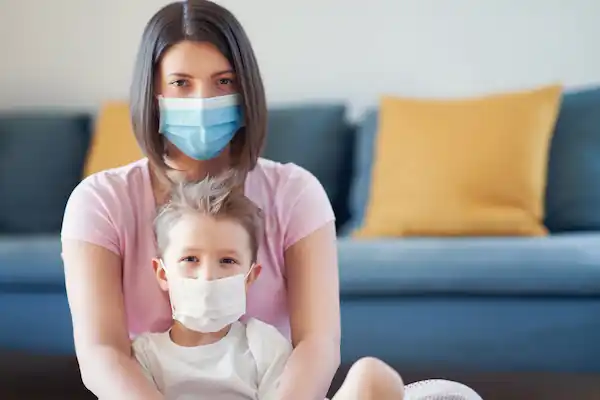To maintain this improved speed and performance over time, strength training should be part of any runner's routine.
When it comes to COVID-19, the disease caused by the new coronavirus, older adults are particularly vulnerable to severe illness. Research shows that adults aged 60 and over, especially those with preexisting conditions such as heart disease, lung disease, diabetes, or cancer, are more likely to contract a severe or even deadly coronavirus infection than other age groups.
If you are caring for an older loved one, you may be concerned. Here's what you need to know to protect seniors and what to do in case of a COVID-19 infection.
Maintain Good Hygiene
First and foremost, as a caregiver, you should take all possible precautions to avoid infection. Here are the basics:
- Wash your hands frequently with soap and water for at least 20 seconds before and after providing care, preparing food, using the restroom, or touching surfaces in public places.
- Avoid crowds, and if you cough or sneeze, do so into your elbow or a disposable tissue.
- Keep your hands away from your face. Clean frequently touched surfaces in your home, including mobility and medical equipment used by your loved one, such as walkers, canes, and handrails.
Practice Social Distancing but Avoid Social Isolation
An important way to reduce the risk of older family members contracting COVID-19 is to limit in-person visits. However, this can be challenging for seniors who enjoy spending time with friends and family. Social distancing doesn't necessarily mean isolation or loneliness. We need to protect older adults while keeping in mind that social isolation can have a negative impact on the immunity and mental health of seniors. With many places of worship closing their doors until the pandemic subsides, worshippers, especially seniors, may feel disconnected. "Faith communities are often an integral part of seniors' social lives." Caregivers could help their loved ones access online services and activities for spiritual comfort and support.
Technology to Stay Connected
To help seniors feel engaged, useful, and less lonely during the pandemic:
- Show them how video communication works with others using smartphones, laptops, or tablets.
- Use apps on these devices to provide captions for adults with hearing difficulties.
- Encourage friends and family outside your household to call, write notes, or send cards to uplift your loved one.
Involve Seniors
It is recommended to give confined seniors a project to work on. "Consider going through and organizing old photos and memories together, and appreciate the stories and happy memories they inspire. This could be a great time for an elderly person to show how to cook a favorite family recipe or share their favorite songs or movies with others in the household."
Minimize the Risk of COVID-19 Infection
Postpone unnecessary doctor visits. If an elderly person in your care is feeling well, consider helping them postpone elective surgeries, annual check-ups, and other non-essential medical visits.
Remember that many older adults, especially those living with a chronic illness, have significant relationships with their caregivers. To help them stay in touch, ask your doctor's office if they offer telemedicine, which allows doctors and patients to communicate via video, email, or other means rather than face-to-face.
Avoid travel. Older adults should postpone non-essential travel, especially cruises or trips where the itinerary would expose them to crowds.
Establish a Plan
If possible, involve an older family member in discussions about how you will handle disruptions in routines and what will happen if they (or another family member) become ill. Talking in advance as a family can reduce stress and help everyone feel more involved and prepared.
Choose an emergency contact. If you are the primary caregiver, designate someone nearby whom you can rely on to take care of your elderly family member if you fall ill yourself.
Stock up. Gather medications for one to three months and at least two weeks' worth of food, over-the-counter remedies, pet supplies, and other essential items. Find out about delivery services available in your area.
Symptoms or Exposure? Call Ahead
If you or your loved one learns that you may have been exposed to someone diagnosed with COVID-19, or if someone in your household develops symptoms such as a cough, fever, or difficulty breathing, call your family doctor, a nurse hotline, or an urgent care facility. Here's what to do if you get sick.
In case of a medical emergency such as severe breathing difficulties or high fever, please call 911.
When it comes to COVID-19, the disease caused by the new coronavirus, older adults are particularly vulnerable to severe illness. Research shows that adults aged 60 and over, especially those with preexisting conditions such as heart disease, lung disease, diabetes, or cancer, are more likely to contract a severe or even deadly coronavirus infection than other age groups.
If you are caring for an older loved one, you may be concerned. Here's what you need to know to protect seniors and what to do in case of a COVID-19 infection.
Maintain Good Hygiene
First and foremost, as a caregiver, you should take all possible precautions to avoid infection. Here are the basics:
- Wash your hands frequently with soap and water for at least 20 seconds before and after providing care, preparing food, using the restroom, or touching surfaces in public places.
- Avoid crowds, and if you cough or sneeze, do so into your elbow or a disposable tissue.
- Keep your hands away from your face. Clean frequently touched surfaces in your home, including mobility and medical equipment used by your loved one, such as walkers, canes, and handrails.
Practice Social Distancing but Avoid Social Isolation
An important way to reduce the risk of older family members contracting COVID-19 is to limit in-person visits. However, this can be challenging for seniors who enjoy spending time with friends and family. Social distancing doesn't necessarily mean isolation or loneliness. We need to protect older adults while keeping in mind that social isolation can have a negative impact on the immunity and mental health of seniors. With many places of worship closing their doors until the pandemic subsides, worshippers, especially seniors, may feel disconnected. "Faith communities are often an integral part of seniors' social lives." Caregivers could help their loved ones access online services and activities for spiritual comfort and support.
Technology to Stay Connected
To help seniors feel engaged, useful, and less lonely during the pandemic:
- Show them how video communication works with others using smartphones, laptops, or tablets.
- Use apps on these devices to provide captions for adults with hearing difficulties.
- Encourage friends and family outside your household to call, write notes, or send cards to uplift your loved one.
Involve Seniors
It is recommended to give confined seniors a project to work on. "Consider going through and organizing old photos and memories together, and appreciate the stories and happy memories they inspire. This could be a great time for an elderly person to show how to cook a favorite family recipe or share their favorite songs or movies with others in the household."
Minimize the Risk of COVID-19 Infection
Postpone unnecessary doctor visits. If an elderly person in your care is feeling well, consider helping them postpone elective surgeries, annual check-ups, and other non-essential medical visits.
Remember that many older adults, especially those living with a chronic illness, have significant relationships with their caregivers. To help them stay in touch, ask your doctor's office if they offer telemedicine, which allows doctors and patients to communicate via video, email, or other means rather than face-to-face.
Avoid travel. Older adults should postpone non-essential travel, especially cruises or trips where the itinerary would expose them to crowds.
Establish a Plan
If possible, involve an older family member in discussions about how you will handle disruptions in routines and what will happen if they (or another family member) become ill. Talking in advance as a family can reduce stress and help everyone feel more involved and prepared.
Choose an emergency contact. If you are the primary caregiver, designate someone nearby whom you can rely on to take care of your elderly family member if you fall ill yourself.
Stock up. Gather medications for one to three months and at least two weeks' worth of food, over-the-counter remedies, pet supplies, and other essential items. Find out about delivery services available in your area.
Symptoms or Exposure? Call Ahead
If you or your loved one learns that you may have been exposed to someone diagnosed with COVID-19, or if someone in your household develops symptoms such as a cough, fever, or difficulty breathing, call your family doctor, a nurse hotline, or an urgent care facility. Here's what to do if you get sick.
In case of a medical emergency such as severe breathing difficulties or high fever, please call 911.






